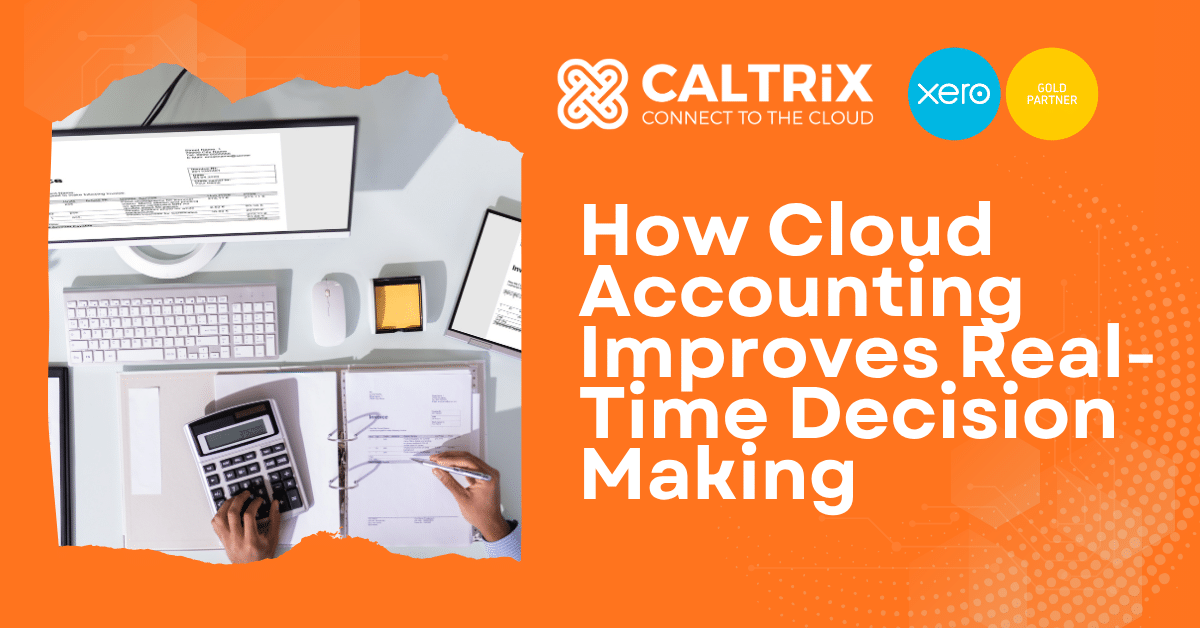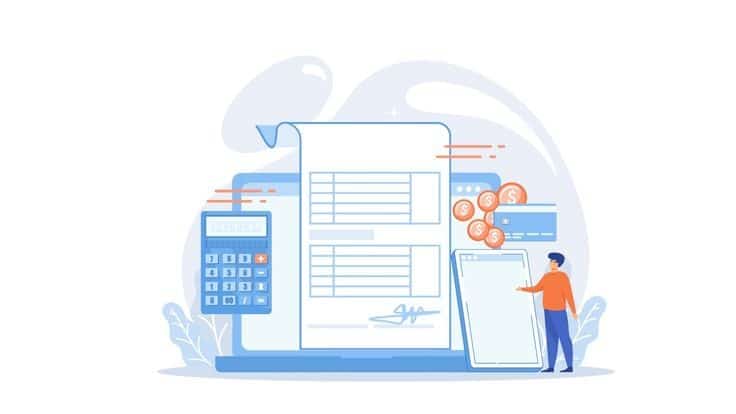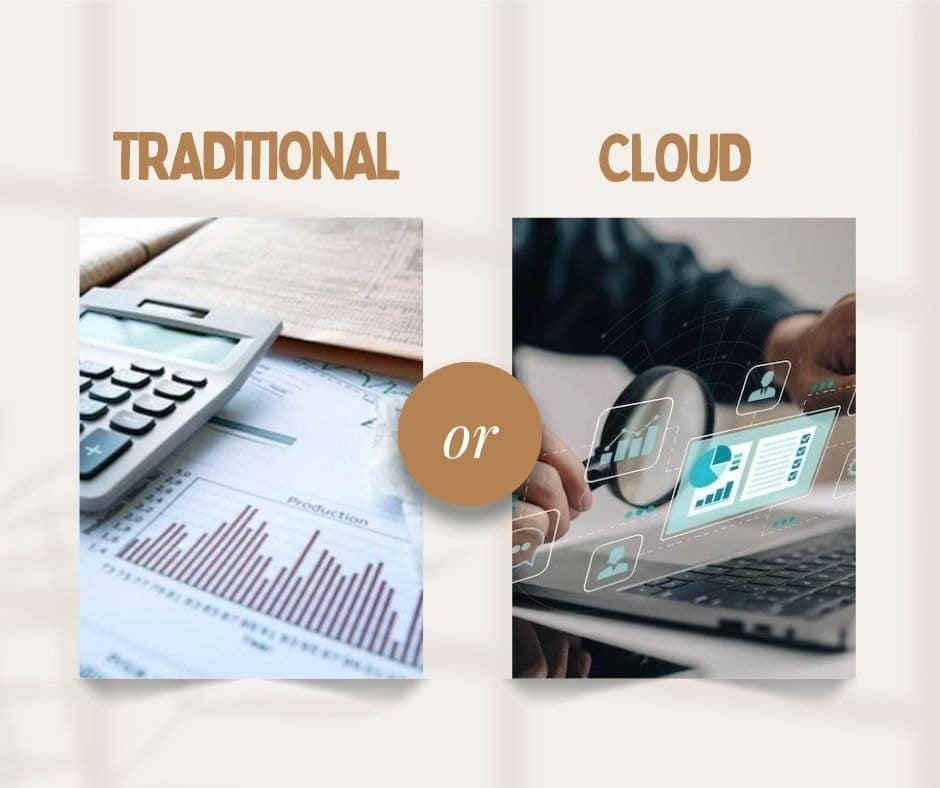What is Cloud Accounting Software?
Cloud accounting software is web-based software. It allows companies to manage their books on the Internet. Instead of installing desktop software, one uses the internet connection to access data. Everything and every business process is stored on web servers managed by a service provider. The setup makes the users capable of doing activities such as invoicing, tracking expenses, and preparing financial reports from anywhere. They just need the internet access. The cloud software automatically updates, offering cloud accounting benefits like automatic data synchronization and continuous improvements. This approach reduces the demand for business premises hardware and constant maintenance. It makes the system more scalable and affordable.
How Cloud Accounting Works
Cloud accounting runs from web servers. The client accesses the system through a web browser or mobile phone app. There is no installation of software on computers required. Financial information is securely stored in the cloud. Transactions, invoices, and banking feeds get automatically synced. Multiple users get real-time feeds on their screens.
The system often gets integrated with banks and other business applications. This integration allows for automatic transaction posting. It renders workflow faster and simpler. Maintenance, backup, and software updates are managed by the cloud provider. This reduces the internal IT staff workload. The system maintains data always updated and safe. It makes businesses more efficient.
Comparison of Cloud-based Accounting Software and Traditional Accounting Software
1. Accessibility:
Cloud: Users can access the software anywhere or on any internet-enabled device.
Traditional: Users can use the software only on the computer on which it has been installed.
2. Data Updates and Sharing:
Cloud: Data updates are instantaneous. Sharing data is easy, especially with consolidated e-invoice systems.
Traditional: Sharing requires manual intervention through file exchange. Updates are time-consuming and manual.
3. Cost Structure:
Cloud: Organizations pay a recurring subscription fee. There are no substantial upfront costs.
Traditional: Companies buy the software just once. They also pay for maintenance and hardware.
4. Collaboration:
Cloud: Several users can simultaneously work with the same data.
Traditional: A single user can work with the data. They share by exporting the files.
5. Maintenance & Updates:
Cloud: The provider maintains automatically updating the application and backing it up.
Traditional: Updates and backups are handled by the company. It takes time and effort.
6. Flexibility & Scalability:
Cloud: Easy to add users or information. It responds very fast.
Traditional: Hard to update hardware or software. It is very time-consuming. The choice of real-time access guarantees timely decisions.
In summary, cloud accounting software gives a dynamic, secure, and cooperative method of managing finances.
How Does Cloud Accounting Help Your Business?
1. Promotes Accessibility and Flexibility
Cloud accounting platforms make your employees able to view money-related data from any location. They are able to view the system wherever and whenever as long as they have access to the internet via any device. This renders them location-independent or work from multiple locations without limitation. It also makes it easier to monitor managers on the firm’s finances around the clock.
2. Provides Real-time Information and Instant Reports
With cloud accounting, your reconciliations and bookkeeping are current and updated automatically. You don’t have to wait for weeks or days for reports. You instead have current data reflecting your latest transactions. That allows you to respond quickly to dynamic cash flows, monitor business performance, and make more tactical decisions using key performance indicators (KPIs).
3. Scales Business Effortlessly
Your cloud accounting system can expand as your business grows. More users or functionalities can be supported without the need for new software and hardware. It supports your growth and keeps costs low and manageable.
4. Makes Collaboration Easier
The same financial information are viewed at the same moment by the rest of the team members, accountants, and advisers. They can work together securely from anywhere. This accounting process facilitates easier communication, faster decision-making, and keeps everyone in rhythm. It also minimizes forwarding files back and forth.
5. Provides Data Security and Auto-Update
Cloud application service providers incorporate high-level security features like encryption, firewalls, and backup to protect your data. The updates are also performed automatically so that you will always have the best features and security patches. It reduces the chances of data breaches and protects your system with minimal effort from your end.
6. Integrates with Other Business Applications
Cloud accounting regularly includes integrations with customer relationship management (CRM) applications, payment gateways, and sector-specific software. These integrations automate procedures by passing data among platforms. This minimizes hand entry, avoids errors, and gives an overall picture of your business activities.
Refer to the blog -> Hubdoc: Your Best Partner to Capture Bill and Receipt | Xero
7. Makes Compliance and Tax Filings Easier
Most cloud-based platforms support electronic tax filing, such as VAT or GST. They ensure compliance with the government. These applications make it easy to calculate taxes and ensure accurate filings. It is a time saver at tax time and reduces the risk of penalty.
8. Lowers Overall Costs
Cloud migration does not need you to purchase expensive hardware and have single IT personnel. You are charged a monthly subscription fee based on your usage. The provider handles automatic updates and upkeep, which translates into your time and money being saved. In the long term, this means a more economical way to handle your finances.
For example, Xero’s monthly cost is RM130 to RM330, depending on the plan you subscribe to. If additional features such as claim expense and track projects, start from RM17 per month.
How does E-invoicing Works in Malaysia?
E-invoice Malaysia steps are used to generate, validate, and exchange invoices electronically.
First, the supplier company sends the invoice electronically. The invoice is a JSON or XML electronic invoice. The invoice contains key information like seller data, buyer data, item description, quantity, price, tax, and total. The invoice contains 55 pieces of information, 37 of which are mandatory.
It is remitted by the supplier to the Inland Revenue Board of Malaysia (IRBM). Either they do it through the MyInvois portal or an integrated business system that has an API. This method offers fast real-time submission.
The IRBM subsequently conducts an e-invoice validation check against the invoice the moment it receives it. When the invoice is in order, the system provides it with a unique identification number (UIN). It also generates a QR code that is inserted into the invoice. The QR code is able to validate the invoice in real time.
Both the supplier and the buyer are informed when the invoice has been verified. The supplier gives the buyer the confirmed invoice and the accompanying QR code. The authenticity of an invoice can be checked by scanning the QR code from the buyer’s side. This is made simple and swift.
In case of a dispute, either one of them is free to request cancellation or rejection of the invoice within 72 hours. They are required to provide valid reasons for rejection or cancellation. Without any disputes, the invoice is digitized upon verification. It is accessible at all times through the IRBM portal. This makes it easy to maintain financial records and keep them in compliance.
In general, the e-invoicing system is an automated means for Malaysian businesses’ billing. It enhances compliance and reduces paperwork. Cloud technology allows the secure sharing of information in real-time. It ensures effective operations and accurate tax reporting. It can be applied to different types of transactions like business-to-business, business-to-consumer, and business-to-government.
As such, online cloud accounting software has a very critical part in e-invoice procedures. You can implement cloud accounting software, Xero, in the shortest amount of time possible with your company, with the support of Caltrix Asia. There is a complimentary clarification call now. Why not engage in a short chat with experts to learn how you can streamline your e-invoicing and accounting infrastructure with on-premises solutions?






